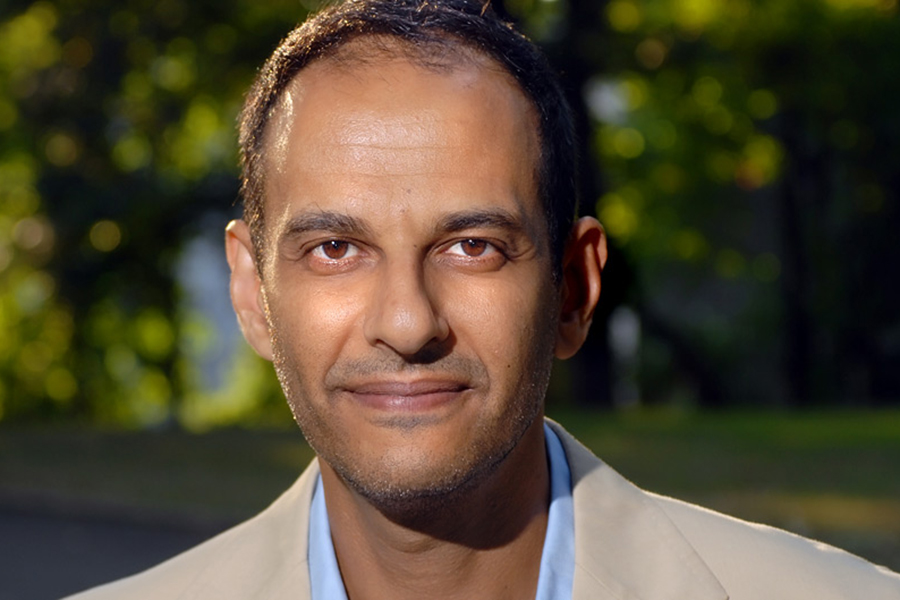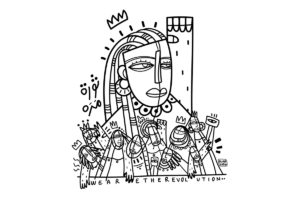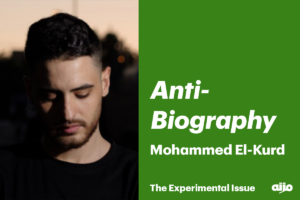
Moustafa Bayoumi’s Foreword in Mizna’s Surviving Issue
Biographical Info
SURVIVAL OF THE PHYSICS
Moustafa Bayoumi was the guest editor for Mizna’s newest issue, 18.1, Surviving. He is best known for his non-fiction writing and his viral tweet during the October 2016 Presidential Debate. Read his foreword to the Mizna, 18.1, below and subscribe to Mizna to read the rest of the issue.

When I was growing up in Canada, the civil war in Lebanon was raging. I was a teenager then, which meant I was focused on other things, like my hair and being one of the only brown kids in my high school, but still I remember the gruesome images of the war filling the nightly newscasts on television along with the grave concern my Lebanese Canadian friends and their parents had for their families back home. There weren’t a lot of Lebanese in Kingston, where I was, but London, Ontario, had many, and I knew the London kids well because we all attended a Muslim camp during the summer and would gather over various weekends during the school year to hang out.
There came a point during the war when there was enough of a lull in the fighting that several of my friends were dispatched by their parents to Lebanon for most of one summer. As is the case today, our parents thought it important to send us to the region when opportunity struck and finances allowed as a way to keep us connected to our families and our traditions. I had likewise traveled to Egypt several times, and there should have been nothing remarkable about my friends going to Lebanon, except of course that there was an unforgiving war going on.
The next time I saw my friends was a few weeks after that summer, when we all gathered for a weekend in London. I remember how we drove several times from one friend’s house to another, sometimes in multiple cars, but whenever we got to a stop light, my friends would suddenly pretend that we had come to a roadblock instead. This was clearly a pantomime that they had played out many times. They made as if tires were burning in the middle of the street and occasionally we all had to pile out of the car. A few times, one friend pretended to check our documents, sometimes throwing one of us into a different car or pretending to arrest one of us before taking that person away. They thought it was hilarious. I thought it was strange.
I was slow to realize, but soon I understood that my friends must have lived through a tremendously stressful time in war-ravaged Lebanon. Of course, these teenagers had the luxury of leaving Lebanon easily and coming back to Canada, and at this time, many new arrivals, refugees from the war, also arrived in Canada. I met many of them, too. The war refugees often had the same look in their eyes as my friends had shortly after that summer, a look that was somewhere between manic and catatonic, though with the new arrivals, the look fell deeper and darker into their eyes.
My friends had bought keffiyehs while in Lebanon and one of them told me a story concerning the keffiyehs in Canada. Another friend of ours worked at his parents’ convenience store. While he was on the late shift one night, the rest of the guys decided to surprise him. They put the keffiyehs on their heads and grabbed those neon pump-action water cannons that were all the rage. They ran into the store, keffiyeh-clad and water gun-toting, pretending to take over the establishment and yelling Arabic expressions at the top of their lungs. My friend behind the counter started laughing uproariously, and then all the kids started laughing the way teenage boys laugh at pranks. It was really funny. Then they heard the words.
“Don’t move,” a police officer commanded. He had his gun drawn and was standing in the doorway of the shop. Around the outside of the store were dozens of other officers, all with weapons drawn, ready to believe that this was an international incident of terrorism targeting a local convenience store. The officer in the doorway looked scared out of his wits and his weapon-grasping hands were visibly trembling, while my friends became frightened for their lives. The police eventually took the boys to the station and called their parents, and then everyone learned why the police were there in the first place. A bystander had seen boys in keffiyehs toting guns. Conclusions were reached.
***
When conclusions are reached, guns are often drawn. Let’s pause for a moment and take a look at this sentence. Grammatically speaking, the sentence is made of up two passive voice constructions, which means the person reaching the conclusion and the people drawing the guns are hidden, shielded from responsibility. In the world of grammar, the passive voice means that the object of a sentence becomes its subject. In the world of real life, this means that a group of people will first be objectified and then be held responsible for the very racism oppressing them. The passive voice is something never to be taken lightly. While it’s true that the passive voice may assist a sentence grammatically, it’s also true that in the real world, the result is too often a death sentence.
Conclusions are reached every day in the United States. Guns are drawn. Shots are fired. My friends are still around, unlike Michael Brown, Trayvon Martin, Tamir Rice, Janet Wilson, Walter Scott, Alton Sterling, Yvette Smith, Philando Castile, and so many others. Real change has yet to come, but, at least since the 2014 protests in Ferguson, national attention has been increasingly focused on the malignant amount of state violence that African Americans face daily. Their consciences pricked, many Arab Americans have been active participants in the Black Lives Matter movement. And activists from across the spectrum are also connecting various movements such as Black Lives Matter to other liberation struggles across the globe in profound ways.
The results of this cross-pollination are appearing in important and sometimes unexpected places. An August 2014 story in Ebony titled The Ferguson/Palestine Connection details how:
“Over 9,000 American officials have trained with Israeli police and military units on responding to civilian protests and terrorism. These operations reflect [a] failure to distinguish between the apparent duty of police to protect civilians and military responses to war. This fusion has had life-costing implications for Americans, specifically black, Muslim, and Arab people.”
Increasingly, this generation is understanding how oppression at home and oppression abroad are not only two sides of the same coin but are also mutually reinforcing and jointly justifying forces. As many good people of conscience and action have noted, the struggle for indigenous rights in the United States cannot be separated from the Palestinian struggle for their rights. We now know that the Bureau of Prisons helped establish the CIA’s clandestine torture program, linking the industrialization of incarceration in the United States to US imperialism abroad. The rush to declare certain people “illegal,” as we are living through in today’s United States, not only forgets the colonial history of this country but also feels like it could be the prelude to a massacre to come.
***
The people making these connections across the world are not only found in the United States, of course. There is an energy today among the global oppressed that traverses geography to discover the common cause of freedom. If this energy could speak, it would probably say something about how we will no longer be bribed and cajoled into accepting half measures and partial solutions to the problems historically created by colonialism, sexism, warfare, greed, and corruption. There is a world of possibility in such a principled position and in the potential of a global assemblage of liberation movements.
But it’s also a truism that every movement produces its opposite. In the United States, an anti-liberation movement clearly exists. In fact, it is currently found under the name of one Donald Trump. What is Trump if not a reactionary, anxious, arrogant, artificially colored, barely literate, and violently sexist manifestation of the old order? Trump is nothing much more than this old order gasping and ailing at the serious fact that their ability to control the world is waning. To understand that is easy. The difficult part is to comprehend that Trump is also the president of the United States.
And in this age of Trump, Arab Americans are living through some of the most trying years we’ve yet encountered in this country, but as a nation, we have never really been far away from what Trump represents. What may be better this time around is our collective ability to discover our common opposition to Trumpism, but we should never forget that what we call Trumpism is a noxious ideology that existed in this country long before Donald Trump appeared.
In our opposition to Trumpism and all it represents, Arab Americans are constituent members of this global liberation collective. There was a time when Arab Americans sought other avenues of politics. One approach was to reassure other Americans that they shouldn’t fear Arabs. Gibran Kahlil Gibran, for example, believed in a somewhat Orientalist notion that Arabs could enrich Western culture with mystical Eastern spirituality. He was hardly alone in this belief. And many Arab Americans after Gibran’s generation often believed in making comprises with the mainstream, all in the name of fitting in. Mohammed became Moe or sometimes even Mike.
Today it’s different. We are no longer debating what we should change about ourselves to be included in this country. (Because, seriously, who needs that old-time bullshit?) Instead, we’re demanding that the country change to include us, which can likewise bring about change beyond the borders of the nation. And we can feel this proud, assertive identity in the pages of this issue of Mizna. “Swallow your blood and bare your teeth, they are seeds,” Jess Rizkallah instructs in aphorisms for lonely arabs (p. 1). This is sound advice.
Here’s some more advice. For years, we’ve actually misunderstood what being Arab American is all about. Being Arab American is not about identity or politics, and it’s certainly not identity politics. It’s about physics. Arab Americans are endless combinations of matter and energy. We are the profound study of movement through space and time. We are the result of the sometimes-forced propulsion of particles and objects- also known as people- from one land to another. And when we crash and collide headlong into each other, something new is born. And yet, our past is mysteriously retained. Ask Paul Kaidy Barrows. He writes about discovering that inside him sits a soul older than himself, one that is “shaped like a tear” and that “glows like an opal but is soft like smoke” (p. 36). Being Arab American is both physics and metaphysics, flesh and spirit. If you think it’s simple and straightforward, read these pages and learn.
What you’ll realize is that today’s artists and writers of Arab America are carefully attuned to the sympathetic hum of the world, that low frequency of understanding that all hounded, subjugated, exploited, tyrannized, and harassed people are hearing today. The oppressed are uniting, and their thrum resonates through this issue. You sense it when reading Bernard Ferguson’s alternative universe in which no human body can be illegal, for example. Here, Ferguson describes an alternative, Whitmanesque place where “we lay on a quilt made by someone’s grandmother and bring enough of a meal for ourselves and whoever is lucky to sit next to us and we watch our favorite films in which everyone we love is still alive and the light flickering across the sky becomes our new god and every blade of grass is green and citizen” (p. 8). You hear it in Marion Gomez’s rumbling rumination on the thoughts sparked by her last name (p. 9). You perceive the thrum turn into celebration in Noor Hashem’s essay on traversing distance and finding inspiration in protest (p. 38), and you hear it throb like a heart urgently pumping blood in Sagirah Shahid’s Yes: “My complexion is a swear word. / I’m sure you’ve noticed. If you’re Black / and Muslim you don’t get a break” (p. 13).
That’s the thing about Arab Americans, Muslim Americans, African Americans, and all of us who make up the maligned masses in the entropic age of Donald Trump. We may be vilified and denigrated, and we may be pushed around like wobbly shopping carts in an empty parking lot, but the cheap politics of people like Trump will burn out long before we become ashamed of who we are and how we connect to each other. Arab Americans, after all, are a microcosm of the cacophony that is this country. We are Christian, Muslim, Jewish, atheist, agnostic, gay, straight, cis, trans, citizen, non-citizen, indigenous, male, female, brown, black, white, refugee, immigrant, resident, alien, Arab, Latinx, African, Asian, European, young, old, English-speaking, Arabic-speaking, and everything in between all of those categories.
And we are more, just like all of us are more. We may be among the people for whom conclusions are drawn, but what we share is the knowledge, born out of experience, that beyond ourselves, each of us is an “other” to someone in power. Out of this truth must come not only our ability to withstand this age but also our ability to triumph over it. Why? Because we cannot -and will not- be objects in any- one’s sentence any longer. With all of our sisters and brothers, we will speak in the active voice and sing our collective music in all the minor keys. Such is the song of our planet. And such is the physics of our survival.
___ ___
Moustafa Bayoumi, a two-time winner of the Arab American Book Award for Non-fiction, is the author of How Does It Feel To Be a Problem?: Being Young and Arab in America (Penguin), and This Muslim American Life: Dispatches from the War on Terror (NYU Press). A professor of English at Brooklyn College (CUNY), Bayoumi has also written for a wide variety of publications and is a columnist for the Guardian.










